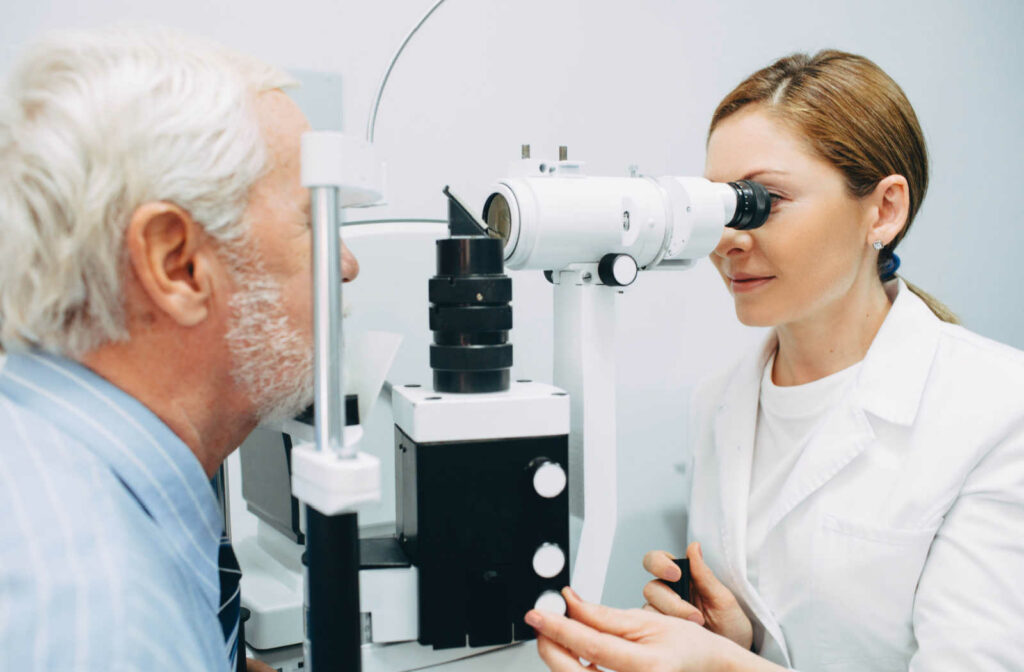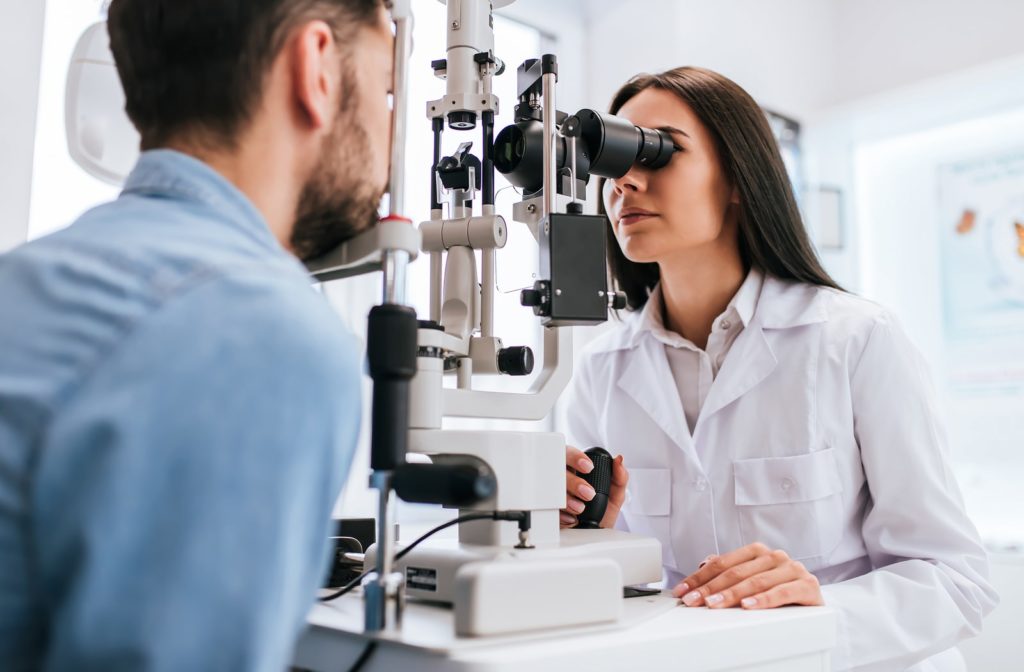You’ve probably heard people talking about our eyes being windows to our souls, which is a nice thought but lacks evidence! On the other hand, routine comprehensive eye exams regularly catch many different diseases and conditions.
Diabetes is one of those diseases that isn’t directly related to your eyes. However, not only can it affect them negatively in the long run, but it can also be diagnosed early through an eye exam. This is important because the early intervention of diabetes plays a vital role in your overall health later.
If you have an increased risk of developing diabetes, your eye doctor may recommend you get a special diabetic eye exam. It’s similar to a regular comprehensive exam. However, some of the additional tests focus on detecting diabetes.
How is Diabetes Detected in an Eye Exam?
During your comprehensive or diabetic eye exam, your eye doctor will likely dilate your eyes. This allows them to use a powerful microscope that lets them look at the inside and back of your eye.
Your optometrist will look at the blood vessels in your eyes, the optic nerve, and the general internal structures. Abnormalities in any of these things may point towards a condition like diabetic retinopathy.
They may also be able to see signs of pre-diabetes. This gives you a chance to treat the disease and possibly prevent it from ever progressing—this is the best-case scenario if the doctor finds signs of diabetes.
Scheduling eye exams regularly is a simple, worthwhile investment that not only protects your vision but your overall health.

Risk Factors for Diabetes
Around 1.5 million people in Canada have diabetes and don’t even know it. Only about 10% of those people have type 1; the rest have type 2. Unfortunately, type 2 diabetes often has no signs or symptoms in its early stages.
Regular screenings (including comprehensive or diabetic eye exams) are the best way to find out early to get the disease under control before you experience the adverse health effects.
Here are a few of the major risk factors for developing type 2 diabetes:
- High blood pressure, cholesterol, and other fats in your blood
- Being overweight
- Polycystic Ovary Syndrome
- Certain psychiatric disorders like schizophrenia, depression, or bipolar disorder have been linked to an increased chance of developing diabetes
- Sleep apnea—especially obstructive sleep apnea
- Acanthosis nigricans
None of these things necessarily guarantee that you will develop diabetes. However, if you have these risk factors, it’s especially important to get the proper examinations regularly.
If you haven’t been diagnosed with diabetes but have some of these risk factors, discuss them with your eye doctor. That way, the doctor can look for any warning signs indicating the development of the disease during the eye exam.
How does Diabetes Affect Vision
If you think that diabetes is only about your blood sugar levels, you may be surprised to know that there are actually several ways that the disease can affect your vision. These effects range from irritating blurry vision to potential vision loss from diabetic retinopathy.
Here is how diabetes can affect your vision:
- Blurry Vision: As your blood sugar fluctuates, it may cause your eye’s lens to swell. In turn, this may cause your vision to be blurry. This blurry may come and go as your sugars fluctuate as well.
- Glaucoma: Because of the pressure changes that diabetes can cause, people with diabetes are more likely to develop glaucoma.
- Cataracts: Many people get cataracts as they age; it’s a common (and easily fixed) eye condition. However, people with diabetes typically get cataracts when they’re younger, and the condition gets bad quickly.
- Maculopathy: If the swelling affects your macula, it could drastically affect your vision. Depending on how bad the swelling gets determines whether or not it can be reversed or treated.
- Diabetic Retinopathy: If this diabetes-related condition is left untreated, it can lead to blindness. It’s connected to high blood sugar levels, so as long as you manage those levels, diabetic retinopathy isn’t difficult to treat.
Other Things Eye Exams Can Detect
Diabetes isn’t the only disease or health problem that an eye exam can detect. It’s actually quite remarkable what our eyes can tell the doctor about our health.
- Autoimmune Disorders: Several autoimmune conditions like lupus, arthritis, or Graves’ disease are detectable during an eye exam.
- Brain Tumors: The swelling caused by brain tumours often presents itself as swelling in the optic nerve.
- Stroke: An eye exam can detect previously unknown mini-strokes you’ve suffered and detect when you’re at a high risk of experiencing a stroke.
- Cancer: Eye exams can detect several cancers. For example, leukemia, lymphoma, and a few different skin cancers are all noticeable during the exam. In addition, sometimes tumours will spread from the neck or chest into the ocular structure.
Booking a Comprehensive Eye Exam in Airdrie
If you’re at risk for diabetes or have any troublesome symptoms, call our office today. Our friendly team at Airdrie Family Eye Doctors can book you an eye exam with one of our optometrists for a time that’s convenient for you.















